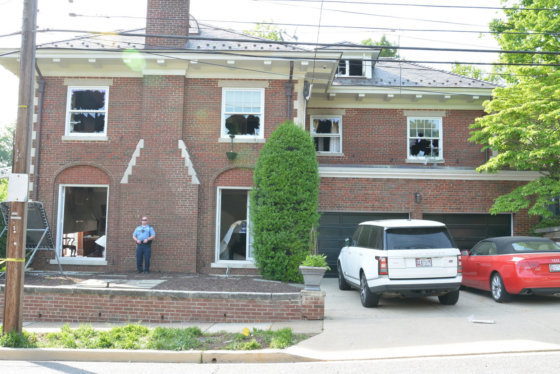
The man convicted of killing three members of a D.C. family and their housekeeper in a case known as the “mansion murders” is seeking a new trial, saying the judge in his 2018 trial improperly blocked his lawyers from calling an additional witness that “robbed the defense from presenting a powerful piece of evidence.”
Daron Wint, 40, was convicted of premeditated first-degree murder in the May 2015 killings of Savvas and Amy Savopoulos; their 10-year-old son, Philip; and Veralicia Figueroa. All four were found beaten and stabbed to death inside the family’s Woodley Park home, which had been set on fire.
The 55-page brief, which lays out the legal basis for Wint’s appeal, was filed with the D.C. Court of Appeals on Dec. 22, nearly two years after he was sentenced to four consecutive life sentences in the killings. The brief was authored by three attorneys with the D.C. Public Defender Service, which represents Wint.
The additional witness relates to the testimony of one of Wint’s brothers, who Wint’s attorneys claimed were the real culprits in the killings.
During his closely watched trial in the fall of 2018, Wint took the stand in his own defense and claimed his two younger brothers had tricked him into going to the Savopoulos’ lavish Northwest D.C. home and leaving his DNA behind, including on a half-eaten pizza crust.
For their part, prosecutors maintained that there was no evidence linking either younger brother to the killings, and that Wint had falsely accused them to evade responsibility for the crime.
Both of Wint’s brothers ended up testifying during the trial, including Darrell Wint, a half-brother, who took the stand during the prosecution’s rebuttal phase of the trial — after the defense had already rested its case.
With Darrell Wint’s testimony and other evidence, prosecutors sought to provide an alibi for the younger brother during the two days the victims were taken captive, tortured and murdered.
Among the evidence prosecutors showed the jury: the testimony of a friend who told jurors Darrell Wint was at his house in Gaithersburg, Maryland, watching his friend’s original music video that was uploaded to YouTube on the same day the crime unfolded, accompanied by a timestamp from the music-streaming platform for the “Hater’s Hate” video.
However, Daron Wint’s attorneys argued another witness would have “strongly cast doubt” on that part of Darrell Wint’s alibi, because a woman who lived at the house said Darrell Wint usually called or texted before he stopped by, and the phone records show the only calls or text between the two were several days after the killings.
The additional witness and phone records “would have offered a critical refutation of the Gaithersburg alibi the government advanced for Darrell,” Wint’s lawyers wrote in the brief.
However, D.C. Superior Court Judge Juliet McKenna blocked defense attorneys from calling the witness at the end of the trial, in part, because the defense had already presented its case.
McKenna, who’s now the presiding judge of the court’s criminal division, ruled that the woman’s testimony was equivocal and wouldn’t have necessarily rebutted Darrell Wint’s alibi. She also concluded that the specifics of Darrell Wint’s alibi did not constitute a “new matter” legally speaking, because defense attorneys had raised questions about Darrell Wint’s whereabouts from the beginning of the trial. Therefore, the defense was not entitled to an additional “surrebuttal” phase of the trial, the judge ruled.
“The trial court was wrong in both respects and this Court should reverse,” the brief stated.
The legal brief is the first movement in nearly two years in a case that captivated and horrified D.C. and garnered international news coverage.
At Daron Wint’s February 2019 sentencing, Assistant U.S. Attorney Laura Bach called the killings “by far one of the most heinous crimes anyone has ever committed” in D.C.
Prosecutors said Daron Wint was motivated by greed. An unemployed welder who previously worked for the Savopoulos company, he held the victims captive for nearly 24 hours and forced Savvas Savopoulos, the CEO of the family-owned American Iron Works, to withdraw $40,000 from the business bank account and have it delivered to the home, according to prosecutors.
Federal prosecutors have until Feb. 23 to file their brief in reply, but that deadline is likely to be extended.
Daron Wint’s murder trial was the subject of the WTOP original podcast, “22 Hours: An American Nightmare,” released in 2019.









